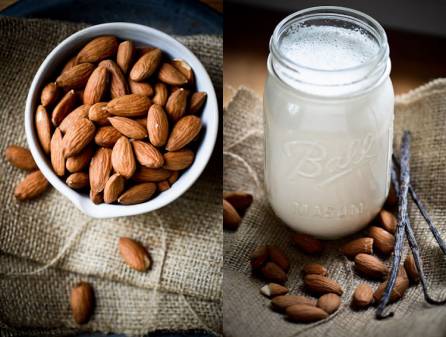Almond milk has gained appeal among health-conscious consumers owing to its lactose-free and plant-based composition, which makes it a good alternative for conventional dairy milk. It is made by combining almonds with water and eliminating any solid particles. The result is a smooth, creamy liquid with a nice, mild nutty taste that is suited for a wide variety of applications, including coffee, smoothies, cereal bowls, and baked goods.
Almond milk nutrition and health benefits
| Nutrient | Amount Per 1 Glass (240 ml) |
|---|---|
| Calories | 30 – 50 kcal |
| Total Fat | 2.5 – 3 g |
| Saturated Fat | 0 g |
| Trans Fat | 0 g |
| Monounsaturated Fat | 1.5 g |
| Polyunsaturated Fat | 0.5 g |
| Cholesterol | 0 mg |
| Sodium | 150 – 200 mg |
| Total Carbohydrate | 1 – 2 g |
| Dietary Fiber | 0 – 1 g |
| Total Sugars | 0 g (unsweetened) |
| Protein | 1 g |
| Vitamin D | 2 – 2.5 mcg (80 – 100 IU) |
| Calcium | 300 – 450 mg |
| Iron | 0.3 mg |
| Potassium | 160 mg |
| Vitamin A | 100 – 150 IU |
| Vitamin B12 | 0.6 – 1 mcg |
Almond milk is a healthy beverage that has several health benefits. Because of its low calorie and fat content, it is an excellent choice for anyone looking to reduce weight or maintain a healthy diet. One cup of almond milk comprises just 30-60 calories, but full cow’s milk contains 146 calories. Furthermore, almond milk has less saturated fat than dairy milk, which contributes to a healthy heart.
Almond milk also includes vital vitamins and minerals such as vitamin E, vitamin D, calcium, and iron. These nutrients are essential for building strong bones, maintaining healthy skin, and ensuring your immune system functions properly. Vitamin E, in particular, functions as an antioxidant, helping to prevent your skin from premature aging caused by free radical damage.

8 Superb Benefits of Almond Milk That Will Make You Go Nuts!
- Lactose-Free Loveliness:
Almond milk is a fantastic alternative for those who are lactose intolerant or just looking to steer clear of dairy. Its creamy texture and nutty flavor mean you don’t have to miss out on the joys of milk—drizzle it on cereal or blend it in smoothies without a hint of lactose in sight! - Heart-Healthy Hero:
Low in unhealthy saturated fats, almond milk is kind on your heart. It contains no cholesterol, which can help keep your arteries clear and support a robust cardiovascular system. Pouring a glass of almond milk might just be a toast to your ticker! - Weight Management Wingman:
With fewer calories than regular cow’s milk—especially if you opt for unsweetened almond milk—it’s an excellent choice for those keeping an eye on their calorie intake. It’s a dream for dieters that don’t want to give up milk’s creamy goodness! - Bone Building Buddy:
Many brands of almond milk are fortified with calcium, which plays a starring role in maintaining strong and healthy bones. Go ahead, fortify your frame with every sip! - Vitamin E V.I.P.:
This silky milk is a brilliant source of Vitamin E, an antioxidant that can help protect your cells from damage. Not only does it have potential skin benefits, but it can also give your immunity a gentle nudge in the right direction. - Dairy-Free Delight:
For vegans and those avoiding animal products, almond milk is a dream come true. It’s entirely plant-based, meaning you can indulge in its creamy texture without diverging from a vegan lifestyle. - Blood Sugar Stabilizer:
Unsweetened almond milk has a low glycemic index, meaning it won’t spike your blood sugar levels. This makes it a sound choice for those managing diabetes or simply trying to maintain a steady energy level throughout the day. - Diverse Drinkability:
So versatile is almond milk that it can be used in cooking and baking as a substitute for cow’s milk, splashed in a cup of coffee, or simply enjoyed by the glassful. Its diversity makes it an invaluable addition to any kitchen.
| Almond Milk Benefit | Why Go Nuts Over It |
|---|---|
| Lactose-Free | Ideal for lactose intolerants and dairy-free diets. |
| Heart-Healthy | Low in bad fats and cholesterol-free. |
| Weight Management | Less caloric than cow’s milk—diet-friendly. |
| Bone Support | Often enriched with calcium. |
| Rich in Vitamin E | Great for skin and immunity. |
| Vegan-Friendly | 100% plant-based goodness. |
| Blood Sugar Friendly | Low glycemic index, great for diabetics. |
| Highly Versatile | Perfect for various culinary uses. |
Almond milk is more than just a lactose-free alternative—it’s a glass brimming with benefits that can cater to a range of dietary needs and health goals. Embrace this nutty nourishment and let your body reap the rewards!
How To Make Almond Milk at Home
Almond milk is a widely enjoyed dairy-free substitute that is not only healthy and low-calorie but also incredibly simple to prepare in the comfort of your own home. By following this straightforward manual, you can produce homemade almond milk that is devoid of any artificial ingredients commonly found in commercial brands. Here’s how you can do it:
Ingredients:
- 1 cup of raw, unsalted almonds
- 2 cups of water, plus more for soaking
- Sweeteners like honey, sugar, agave syrup, or vanilla extract (optional)
Equipment Required:
- Bowl for soaking almonds
- Strainer or colander
- Blender or food processor
- Cheesecloth or a nut milk bag
- Measuring cup
- Sealable container or bottle for storage
Step 1: Soaking the Almonds
- Place the almonds in a bowl and cover them with about an inch of water.
- You can let the almonds soak for one night or even up to two days. The longer you let them soak, the smoother the almond milk will become.
- After soaking, make sure to drain and rinse the almonds well using cool running water.
Step 2: Preparing the Almond Milk
- Place the soaked almonds and 2 cups of water into your blender or food processor.
- Blend on the highest setting for 2 minutes. The almonds should be broken down into a fine meal, and the water should have turned white and opaque.
Step 3: Straining the Almond Mixture
- Over a bowl or pitcher, lay out your cheesecloth or nut milk bag.
- Pour the almond mixture into the cloth.
- Gather the cloth or bag around the almond meal and twist close.
- Gently squeeze and apply pressure using clean hands to get as much almond milk as you can. If your strainer or cloth is on the smaller side, you may need to do this in multiple rounds.
Step 4: Flavoring the Almond Milk (Optional)
- Pour the milk back into the blender.
- Add any desired sweeteners like honey, sugar, agave syrup, or vanilla extract.
- Blend to mix in the sweeteners evenly.
Step 5: Storing the Almond Milk
- Put the almond milk into a container or bottle and close it tightly.
- Keep in the fridge.
- Use within two to three days for the best quality and freshness.
Additional Notes:
- The leftover almond meal can be dried out and used in baking, as a grain-free flour alternative.
- Experiment with the water-to-almond ratio to find your preferred thickness and richness.
- Remember that homemade almond milk will separate over time. Shake well before using it.
- Use your homemade almond milk in smoothies, coffee, tea, or cereal.
For optimal quality and freshness, it is recommended to consume within a period of two to three days.
Stories of people who are living a healthy lifestyle using almond milk
Helen’s Journey with Almond Milk:
Once upon a healthy note, Helen found herself at a crossroads with her health. With a family history of dietary sensitivities, she was determined to take control. Abandoning artificial ingredients and committing to organic choices, Helen made a monumental switch. Almond milk became her elixir of life — replacing the dairy she loved with the nutty goodness that loves her back. She whips up her morning smoothie just in time to greet the sun, the creamy texture of her homemade almond milk blending perfectly with vibrant berries. Her energy levels soared, and her skin thanked her with a glow that matched her newfound vitality.
Ann’s Nutty Revolution:
For Ann, it all began with a cookie — a wholesome, almond milk-infused cookie, that is. A relentless advocate for nutrient-dense treats, she embraced Amy’s philosophy from “Almond Milk and Cookies”. Ann smiled as she painstakingly perfected her cookie recipe, ensuring each bite burst with natural flavors and wholesome goodness. She believed in sweet indulgence coupled with body-nourishing ingredients, and her delectable cookies were just that — guilt-free and brimming with health.
Amanda’s Culinary Quest:
In a kitchen adorned with her beloved spices and a pantry stocked with natural staples. Cooking was her therapy; her recipes, a testament to Amy’s mission of whole foods. She relished the stories from Chefs and Restaurateurs Helping To Promote Healthy Eating, seeing herself as part of a larger tapestry weaving the richness of health and flavor. Amanda’s almond milk becomes not just an ingredient but a symbol of the lifestyle she chose — one that perpetually champions wellness.









